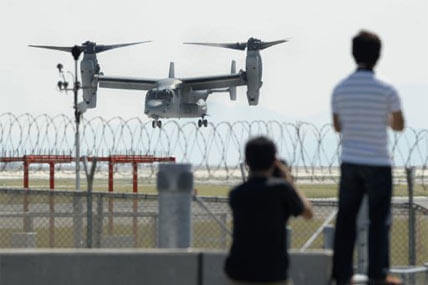Defense Secretary Chuck Hagel said Monday the U.S. supported Japan in its territorial dispute with China over offshore islands and announced the U.S. would bolster Japan's defenses with MV-22 Ospreys and advanced radars opposed by Beijing.
While proclaiming U.S. neutrality, Hagel referred to the islands by their Japanese name -- Senkaku. "We do recognize they are under the administration of Japan" and also fall under the 1997 U.S.-Japan mutual defense treaty.
The tilt-rotor Ospreys and the AN/TPY-2 phased array radars to protect against long-range missiles could also be seen as a message of resolve against North Korea. The advanced radar would help defend "both our nations from the threat of North Korean ballistic missiles," Hagel said.
"The most obvious threat to stability in the region is the provocative behavior" of North Korea, Hagel said.
"Japan is determined to protect its land, water and air," Japanese Defense Minister Itsunori Onodera said at a joint Pentagon news conference with Hagel. Onodera repeated Japan's claim to the disputed islands, which the Chinese call Diaoyu. He said Japan was "opposed to any action which would change the islands' status by force."
In a dispute going back centuries, Japanese and Chinese air and naval forces have increasingly confronted each other over the status of the islands, which are believed to control access to potentially rich deep-water oil fields.
Last week, Onodera met his Chinese counterpart in Beijing in an attempt to ease tensions over the islands, but Japanese Prime Minister Shinzo Abe said later that Japan was ready to protect the islands by force if necessary.
Abe's new government has been accused by China of attempting to revive policies that harken back to Japan's militaristic past. China and other nations in the region have voiced concern over recent visits by Japanese lawmakers to Tokyo's Yasukuni shrine, where several war criminals from World War II are honored.
Former Secretary of State Hillary Clinton had previously stressed U.S. neutrality in the islands' dispute and Hagel insisted that U.S. still "opposes any unilateral action" to establish sovereignty over them.
Last year, Beijing denounced the action of former Defense Secretary Leon Panetta in making the first deployments of AN/TPY-2 radars and Ospreys to Japan.
The deployment of a squadron of 12 Ospreys was bitterly opposed by many Japanese on Okinawa, where they are now based. Onodera and Hagel said the basing of a second squadron of 12 Ospreys had not yet been decided, but the Ospreys were expected to arrive this summer.
Regarding the North Korean threat, Hagel said that the imminent end of joint military exercises with South Korea -- denounced as warmongering by North Korea -- should not be viewed as a reduction in the resolve of the allies to rein in aggression from Pyongyang.
"We are prepared for any contingency," Hagel said.




























